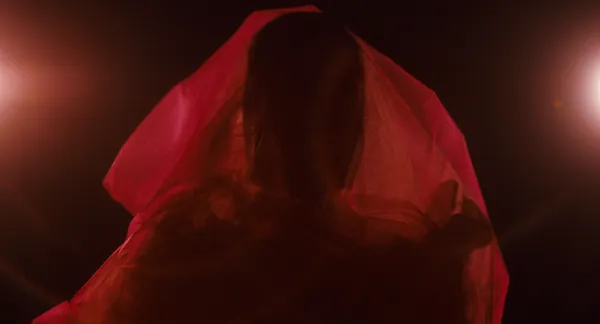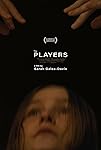Eye For Film >> Movies >> The Players (2025) Film Review
The Players
Reviewed by: Jennie Kermode

Watching performers in a local park, Emily (Stefani Kimber) decides that she wants to be an actor. She also wants to be independent. She wants to be accepted into an adult world. Later, theatre director Reinhardt (Eric Johnson) will raise concerns amongst the other members of the troupe when he says that he wants to open by putting her onstage in a paper dress and setting fire to it. She will tell them that it’s okay by her.
In the aftermath of the #MeToo movement, director Sarah Galea-Davis began to explore her own memories of being a young actor, and to share stories with others. The result is this film, screening as part of the 2025 Glasgow Film Festival. It’s a moody, unsettling piece, in part because of her skill in capturing nuance – real and perceived. It also has a raw quality which makes it compelling, though sometimes painful, to watch.

Emily is told that there’s something raw about her soon after she’s recruited. She’s 15, and whilst that remark might seem like praise for the natural absence of those barriers that older actors often work hard to deconstruct, it’s also an observation that she lacks emotional defences – there’s something almost predatory about it, despite the fact that it comes from a woman who shows no sexual interest in her. Later, she will be told by other young women that being hit on by directors is par for the course in the industry, and that she will have to learn to ‘play the game’ if she wants to succeed, maintaining their interest but keeping them at arm’s length. A young male colleague will imply that success is easier for her because “as a girl, you have certain advantages.”
Advantage is not the word that comes to mind as we watch this sheltered teenager try to navigate an increasingly complicated situation. She gets little support at home; her parents are separated, her father’s protectiveness is rules-based and takes little account of reality, and her mother is going through an emotional crisis of her own. Some people in the troupe express sympathy, even offer practical support, but she may not be able to rely on them as much as she needs to. Sometimes the young women give the impression that they want her to stick around because that way it’s less likely to happen to them.
Galea-Davis subverts the language of more positive coming of age films, with blurred visuals and coloured lights on a night out suggesting illness rather than pleasure. Emily laughs when she’s emotionally overwhelmed. She takes self defence classes which are all about scanning one’s surroundings for physical threats, all about fighting. They do nothing to prepare her for the real danger she faces. The class teacher tells her student to constantly be aware of themselves as potential victims. Alone at night, Emily meets a deer wandering along an urban street. Does are classically used to represent prey, but the moment of understanding which passes between the two is anything but reductive.
The troupe is full of intense, messy relationships. Preparing for performances, emotions overflow. At times Reinhardt seems to delight in humiliating women, but how much of it is simply his way of working, of helping them to achieve the level of performance they want? Some of them seem grateful. Does he realise what a monster he can be – does he have any real sense of boundaries himself? There is talk of love, which most adults might consider to be something quite different, but Emily is not an adult, is not ready for this. What becomes increasingly hard to define as anything other than a process of grooming does its own damage. Galea-Davis understands that it’s not just physical interactions that can cause lasting harm.
Can Emily escape? Can she take control of her life and become a true player herself? Kimber (older than she looks) delivers a remarkable, sensitive performance which in itself proves that rawness in real life is not necessary to convey it to an audience. We see Emily’s struggles and we see her developing wisdom. Though she may strive to become a vessel for other characters, she is developing her own.
Reviewed on: 26 Feb 2025
















